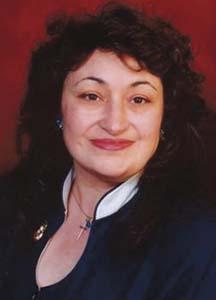

 POWELL, Wyoming -- Farmer Klodette Stroh is thankful for her childhood spent learning to speak multiple languages and living in a multicultural community in the Middle East as it helped shaped her future in agriculture in the United States.
POWELL, Wyoming -- Farmer Klodette Stroh is thankful for her childhood spent learning to speak multiple languages and living in a multicultural community in the Middle East as it helped shaped her future in agriculture in the United States.
"I feel my experiences in a multicultural society has enhanced and influenced my deep respect, tolerance and understanding of the diversity of our world," said Klodette, who farms with her family near Powell, Wyo.
Klodette was raised as an Assyrian in Tehran, the capital of Iran, where she learned to speak Aramaic, Persian, He-brew and Turkish.
The Assyrians are known as the nations of Mesopotamia, or the cradle of civilization, said Klodette.
"They farmed along the Tigris and Euphrates rivers," she said. "I was raised with great respect for the land and the farmers who till God's land to grow food to feed his people."
The Assyrians are also Christian Catholics, though they live side-by-side with Turkish, Kurdish, Moselms, Armeni-ans and Hebrews.
"The Middle Eastern culture is a very collective culture with unique customs, ancient traditions and values," said Klodette. "They pay close attention to the communication means of speech, body language and respect."
Raised as a Christian Catholic, Klodette takes her faith in God very seriously, as does her husband, Rick, whom she met while attending Northwest College in Powell.
"God is the center of our lives," she said. "My husband, Rick, and I gave all of our hearts to God because we knew without God's intervention and his blessing, we would never have started farming."
Rick Stroh was raised on a farm near Powell. His father, Reuben Stroh, also a farmer moved from his childhood home in Colorado to Powell in the 1940s and began his career in agriculture.
"Rick was raised in Powell and worked alongside his father on farms around our community," said Klodette. "We got married and I set aside my dream of becoming a doctor. Rick's dream was to be able to operate his own farm."
In 1989, the Strohs realized their dream to operate their own farm. Today, they farm nearly 2,000 acres of beans, malt barley and hay, which they feed to their cattle. Each member of the Stroh family works on the family farm.
"I take care of the budget," explained Klodette. "We have three children - our son, Rick Jr., and twin daughters, Kyrre and Karry. Rick Jr. and our nephew, Paul, who is like another son to Rick and I, help us with our farming.
"Our son has his bachelor's degree in agriculture economics and business but he likes farming and building high performance engines," she said.
Through her years of farming in northern Wyoming, Klodette began to question government involvement in agriculture.
"Unstable commodity prices and government regulation encouraged me to ask questions and write letters to the United States lawmakers," she said. "Farmers and ranchers spend money 364 days a year and have only one pay day if everything goes right." As her interest in agriculture policy grew, Klodette joined and became active in the Wyoming Women Involved in Farm Economics (WIFE) organization.
She began representing sugar and corn sweetener producers as the national sugar chairman for the WIFE organization.
"I traveled to Washington, D.C., for the 1996 farm bill to testify and met with Dan Glickman, who was the secretary of agriculture, and Kika de la Garza, who was the ranking chairman for the House Agriculture Committee," Klodette recalled.
In 1997, Klodette was elected to serve the local irrigators as the Shoshone Irrigation District water commissioner. Now, she serves the local irrigators as vice president of the district board.
"The SID (Shoshone Irrigation District) board appointed me to represent them on the Joint Power board, on which I worked with a $15 million budget for the rehabilitation and betterment on the 97,000 acres of water-righted land," said Klodette.
As a result of the appointment, Klodette had to dive into the complicated world of water laws.
"I love to learn, and I make sure I do my homework," she said. "Water laws have a language of their own, and I know the federal and state water laws."
Klodette's hard work and service to the local irrigators paid off when she was elected to serve as the District 5 water commissioner this past February, a position in which she is excited to serve.
"This year is the 100-year anniversary for the Shoshone Irrigation District," said Klodette. "The Buffalo Bill dam and the Shoshone irrigation project is the largest federal irrigation project in the State of Wyoming."
By Shannon Ruckman
www.theprairiestar.com

or register to post a comment.